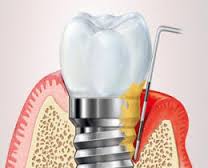Treating Complications Confidently
Introduction
Although statistically, the most successful and long-lasting tooth replacement treatment we provide, like any medical treatment dental implant replacement therapy can experience undesired outcomes and complications. Some of these complications are a result of the implant, or they can be from the tooth or teeth that were placed on the implant. Regardless of when or how the complications arise, all of them are treatable and most of them reversible. Some of the more common complications can result in:
Common Complications
Peri-implantitis
 Infection of the implant associated with bone loss around the implant. This condition has many different causes. Treatment options include reshaping the implant, grafting the implant surface with a bone graft, or potentially replacing the implant.
Infection of the implant associated with bone loss around the implant. This condition has many different causes. Treatment options include reshaping the implant, grafting the implant surface with a bone graft, or potentially replacing the implant.
Peri-implant Mucositis – Chronic or Acute
Reversible inflammation of the gum tissue around an implant (similar to gingivitis in natural teeth) not associated with the supporting bone but could turn into peri-implantitis and begin affecting the bone if not treated. Signs can be bleeding or pus in the gum tissue surrounding the implant.
Thankfully with the advent of Laserloc technology in Biohorizons implants and Cad Cam abutments, these conditions are typically rare.
Pain Upon Biting or Function
A loose connection between the implant and the tooth replacement could potentially be a cause for pain on biting/chewing. Sometimes this is associated with a loose abutment or component pinching the gum tissue and leads to pain and inflammation. This can also result from a concern with the bite or deeper where the implant is close to other sensitive structures.
Repeated Loosening or Falling Out of Replacement Tooth or Teeth
A loose abutment screw or sometimes even an older style of an implant can create a scenario where the crown portion of the implant tooth may come out or get loose repeatedly. It is usually worse when the bite is off-center and not balanced. If it is held in with cement and is having problems staying in either a different cement or abutment design may be necessary.
The recession of the Gum, Gray Color or Unattractive End Result
This is a common concern with titanium abutments in the front or “esthetic zone” and may be related to thin or inadequate gum tissue to “hide” the titanium underneath. We commonly use Zirconia, the white metal for these instances.
If gum recession is present then there may be a concern with the initial bone and gum quantity or position of the implant. It also could be a sign of bone loss or even peri-implantitis leading to a failed implant.
Breakage of Replacement Teeth or Chipping of Teeth
Since implant teeth restorations are made of different materials (acrylic, porcelain/metal, and zirconia) they have different qualities and some are more resistant to breaking and chipping. Chipping is a concern with porcelain and especially acrylic teeth and may indicate that the “bite” is off. These chips can be smoothed off, added to, or may need to be completely replaced, without affecting the actual implant underneath. We commonly utilize Zirconia referred to as “white steel” and it is our most durable esthetic material. Together with digital bite analysis, we are confident in the longevity of your replacement.
Swelling or Bad Taste/Smell
Sometimes inadequate hygiene can result in a bad taste or smell and lead to swelling of the gum surrounding the implant. It could also be a sign of a more serious infection or peri-implantitis (see above). Often acrylic-hybrid restorations can discolor and produce an odor after time.
Loose, Failing or Implants that “Fell Out”
This is a classic failed implant and must be removed.
Prevention
Dr. Oshetski is a leader in the field of managing implant complications. The easiest way to prevent complications is to have treatment with an experienced dentist credentialed in dental implantology such as the American Academy of Implant Dentistry (AAID). Dental implants therapy is a sophisticated treatment and a recognized specialty by the American Board of Dental Specialties (ABDS). The ABDS recognizes Diplomates of the American Board of Implant Dentistry/ Implant Dentistry (DABOI/ID) the most logical “Implant Specialist” for the public to seek. These dentists are tested through a rigorous examination process are among the few dentists competent to complete complex treatment plans and resolve complications as those mentioned above.
Contact Us Today
If you are experiencing a complication with an implant(s) or a provider with a patient who needs a referral please contact our office at or at droshetski@gmail.com.

